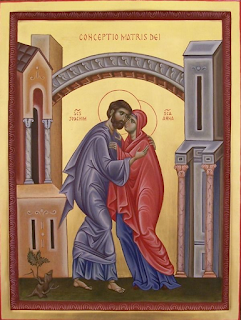In Hannah, we see a barren woman. Hannah is the first wife of the priest Elkanah. Peninnah, his second wife, had children and would bring grief to Hannah. Hannah, asking the Lord for a child, was blessed with one whom she would dedicate to the Temple of God. This also is a figure of the story of Abraham, Hagar, and Sarah. For Sarah is barren and ordered Abraham to have relations with Hagar delivering Ishmael. But Isaac was the chosen son. Sarah would later bear Isaac in her old age. From barrenness comes the greatest fruit of the Church for it was also in Hannah's namesake, Anna, the mother of Our Lady, who we would see another barren woman give birth to the child who would bear the Christ-Child. Not only in that are the two women of Hannah and Mary connected, but also in many other features.
For both Hannah and Mary, there is a miraculous nature to the conception of their children. Mary has a Virginal conception, her Son, God-Incarnate, Jesus Christ, is to be born without Her knowing any man. For Hannah, she was barren, but the Lord fulfilled her prayer for a child. Anna, who was Mary's mother, and is celebrated with her namesake Hannah on the Feast Day of the Conception of Mary, dedicates her child to the Temple from infancy as does Hannah with the Prophet Samuel. The Prophet Samuel not only came before the period of the Israelite Kingdom, but also would anoint both the first and second Kings of Israel. In a sense, Hannah is also intricately connected with the barren Elizabeth, the cousin of the Virgin Mary.
Elizabeth bears the forerunner John Baptist who announces the coming Kingdom of Christ as did Samuel announce the Kingdom of Saul and then the Kingdom of David. Hannah gives birth to the first forerunner and Elizabeth gives birth to the second forerunner. The first forerunner paved the way for the Kingdom of Israel to be made. The second forerunner paved the way for the King to take His throne in the Kingdom. Thus, Hannah is intricately connected to the Virgin Mary by being a prefigurement of the Forerunner's Mother. But Hannah is also a prefigurement of the Virgin Mary herself.
In both the account of Hannah's miraculous birth to Samuel and the Virgin Mary's miraculous birth to Jesus Christ, the women are seen giving praise to God in poetry. Hannah gives praise in 1 Sam. 2:1-10 and Mary gives praise in Luke 1:46-55. In both Hannah's prayer and in the Virgin Mary's prayer, we see how the roles in society have become inversed in the miraculous accounts of the birth of their children. The rich have been sent away empty and those who were once fruitful have become barren. The two show a reversal of fortunes in the account of the birth of their children.
In Hannah, the church fathers saw a prefigurement of the New Testament. Hannah displaces Peninnah as she gives birth to the Prophet Samuel. Much as in the birth of Isaac, St. Paul draws a prefigurement of the children of God in contrast to the children of the bondwoman. Hannah symbolizes the New Testament Church and Peninnah the Old Testament Church. The Old Testament Church turns to apostasy as it refuses to hear the Gospel and accept their own Messiah. The New Testament Church comes to fulfillment in the Gospel and they receive their Messiah and their King. Hannah receives the fullness of the Kingdom of Christ and Peninnah, as the apostate Jews, is sent away empty in her own blasphemies as she chose to mock the holy woman.
Hannah is a prefigurement of her namesake Anna who is celebrated today when we celebrate the Conception of the Virgin Mary. Hannah is celebrated the same day as the Conception of the Virgin Mary because she foreshadows Anna. Not only does Hannah foreshadow Anna in bearing a child to be dedicated to the Temple, she also foreshadows Elizabeth in bearing a forerunner to the Kingdom of Israel on Earth as Elizabeth bore the Forerunner to the Kingdom of Heaven. And finally, Hannah, in her song of praise, foreshadows the Blessed Mary Ever-Virgin's song of praise in thanksgiving to Our Lord for having become the vessel of Divine Grace. Mary, full of grace, is born of grace, for the name Hannah in Hebrew means "grace". The name Anna is the Greek variant of Hannah. Greek Catholics have retained the Feast Day of Our Lady's Conception for today because it falls on the Feast Day of the Holy Mother of Samuel, and also because Our Lady's birthday is September 8. Because Our Lady's grace was received from God, the one-day off signifies this only defect that Our Lady experienced in Her entire life from conception onward, in that she was not fully God.


No comments:
Post a Comment